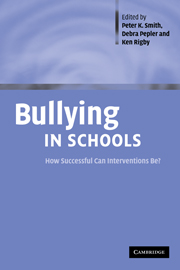Book contents
- Frontmatter
- Contents
- List of figures
- List of tables
- Notes on contributors
- Preface
- 1 Working to prevent school bullying: key issues
- 2 The Olweus Bullying Prevention Programme: design and implementation issues and a new national initiative in Norway
- 3 Is the direct approach to reducing bullying always the best?
- 4 Implementation of the Olweus Bullying Prevention programme in the Southeastern United States
- 5 Prevention of bullying in German schools: an evaluation of an anti-bullying approach
- 6 England: the Sheffield project
- 7 Making a difference in bullying: evaluation of a systemic school-based programme in Canada
- 8 Interventions against bullying in Flemish Schools: programme development and evaluation
- 9 SAVE model: an anti-bullying intervention in Spain
- 10 Australia: the Friendly Schools project
- 11 The Expect Respect project: preventing bullying and sexual harassment in US elementary schools
- 12 A follow-up survey of anti-bullying interventions in the comprehensive schools of Kempele in 1990–98
- 13 Targeting the group as a whole: the Finnish anti-bullying intervention
- 14 Ireland: the Donegal Primary Schools' anti-bullying project
- 15 Bernese programme against victimisation in kindergarten and elementary school
- 16 Looking back and looking forward: implications for making interventions work effectively
- Author index
- Subject index
- References
3 - Is the direct approach to reducing bullying always the best?
Published online by Cambridge University Press: 02 December 2009
- Frontmatter
- Contents
- List of figures
- List of tables
- Notes on contributors
- Preface
- 1 Working to prevent school bullying: key issues
- 2 The Olweus Bullying Prevention Programme: design and implementation issues and a new national initiative in Norway
- 3 Is the direct approach to reducing bullying always the best?
- 4 Implementation of the Olweus Bullying Prevention programme in the Southeastern United States
- 5 Prevention of bullying in German schools: an evaluation of an anti-bullying approach
- 6 England: the Sheffield project
- 7 Making a difference in bullying: evaluation of a systemic school-based programme in Canada
- 8 Interventions against bullying in Flemish Schools: programme development and evaluation
- 9 SAVE model: an anti-bullying intervention in Spain
- 10 Australia: the Friendly Schools project
- 11 The Expect Respect project: preventing bullying and sexual harassment in US elementary schools
- 12 A follow-up survey of anti-bullying interventions in the comprehensive schools of Kempele in 1990–98
- 13 Targeting the group as a whole: the Finnish anti-bullying intervention
- 14 Ireland: the Donegal Primary Schools' anti-bullying project
- 15 Bernese programme against victimisation in kindergarten and elementary school
- 16 Looking back and looking forward: implications for making interventions work effectively
- Author index
- Subject index
- References
Summary
Introduction
Projects to reduce bullying have had some notable successes, both at local level (e.g. Smith and Sharp, 1994) and in local evaluations of national programmes (e.g. Olweus, 1993, Roland, 2000; Roland and Munthe, 1997). However, the gains have often been short term. When they have been maintained at two-year follow-up, as in the project in Bergen, Norway, it seems probable that progress was maintained by the researchers visiting schools in the follow-up period to give them feedback and to discuss further work with staff (Olweus, 1991, 1993; Roland, 2000; Roland and Munthe, 1997). While adopting a range of procedures, the primary focus of these projects was on bullying as a psychosocial problem. They sought to raise awareness of it among pupils and teachers, to convince everyone in the school community that it was unacceptable, and to describe methods to stop ongoing bullying. The 1996–97 project in Norway (Roland, 2000; Roland and Munthe, 1997) broadened the scope to emphasise the quality of day-to-day classroom management.
The mainly bullying-focused approach described above is consistent with a large body of literature, which has investigated characteristics of bullies and their victims. Thus Olweus (1993) argued that bullying results from adverse home conditions, which create a stable aggressive trait within some pupils. Crick and Dodge (1994) saw a social-skills deficit as the origin of bullying.
Information
- Type
- Chapter
- Information
- Bullying in SchoolsHow Successful Can Interventions Be?, pp. 37 - 54Publisher: Cambridge University PressPrint publication year: 2004
References
Accessibility standard: Unknown
Why this information is here
This section outlines the accessibility features of this content - including support for screen readers, full keyboard navigation and high-contrast display options. This may not be relevant for you.Accessibility Information
- 44
- Cited by
